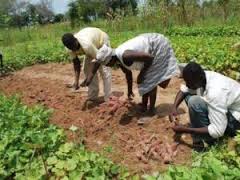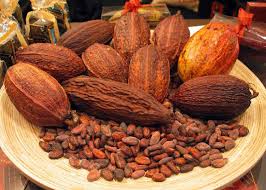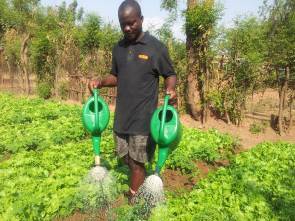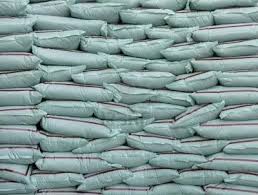 Peasant farmers are being shortchanged by businessmen they (peasant farmers) term ‘24-hour farmers’, who purchase subsidised fertiliser from the government and re-sell to the peasant farmers at exorbitant prices.
Peasant farmers are being shortchanged by businessmen they (peasant farmers) term ‘24-hour farmers’, who purchase subsidised fertiliser from the government and re-sell to the peasant farmers at exorbitant prices.
“There are some people who claim they are farmers but they are not farmers at all; they are ‘24-hour’ farmers. They are businessmen who go and buy the fertilisers when they are released by the government. They then send them across the country and sell them and make more money.
“So the farmers are waiting for subsidised fertilisers that never come,” Abdul-Rahman Mohammed, National President of the Peasant Farmers Association of Ghana (PFAG), has said.
Speaking at a workshop for peasant farmers in Accra on the “2014 Year of Agriculture: What Does it Mean for Food Security, Nutrition and National Growth in Ghana”, Mr. Mohammed bemoaned the lack of efficiency in the fertiliser policy and how peasant farmers are left poorer than before.
The agric sector plays a key role in the overall economic growth and development of Ghana and employs about 50.6 percent — that is 4.2 million — the country’s working population.
In 2008 the fertiliser subsidy programme was established to help farmers increase their rate of fertiliser application as a means of increasing crop productivity, as well as increase the country’s fertiliser application. During the 2013 farming season, farmers were made to bear the international and local transportation cost of delivering fertilisers while government subsidised it by over 21 percent.
“The policy is not helping us and we are being shortchanged. The fertilisers should be channeled through the accredited associations like the Peasant Farmers Association of Ghana for onward distribution to the farmers. “But in the absence of that, businessmen will always be exploiting us. We are using the fertiliser, but the fertilisers are released to regions by quotas and businessmen go and take them and then sell to us, which does not help us,” he said.
The president added that apart from the PFAG, there are several other recognised farmer organisations that can receive the fertilisers on behalf of farmers for equitable distribution to their members.
“There are so many organisations that deal with farmers on the ground. So if they are taking the lead and supplying the fertilisers to farmers, then the farmers will get the fertiliser and the businessman will be out.”
He urged the government to sustain the subsidies, because their advantages far outweigh the disadvantages.
“The subsidies are helping the farmers a lot. During the absence of subsidies, farmers were earning no profits; but now farmers make money, pay fees for their children and do other things. We are appealing to government that subsidies must be sustained.”
Food and Agriculture Minister Fiifi Fiavi Kwetey noted that globalisation and climate change have presented great challenges to the small-scale producer, and in order to survive, small-scale farmers have to become efficient in value chain management and produce quantities and qualities required by the market.
“Cost-effectiveness, efficiency, quality production, trading and negotiation at the market level have therefore become critical to ensuring that our farmers become competitive enough to satisfy their food and income needs, in order to improve their livelihoods.”




